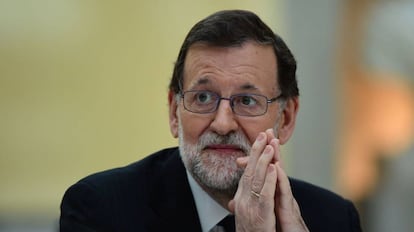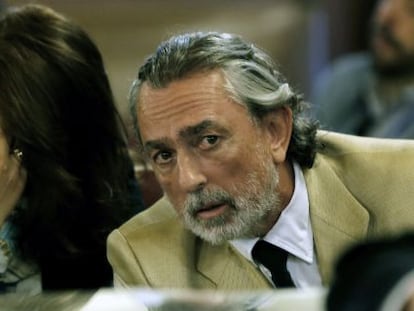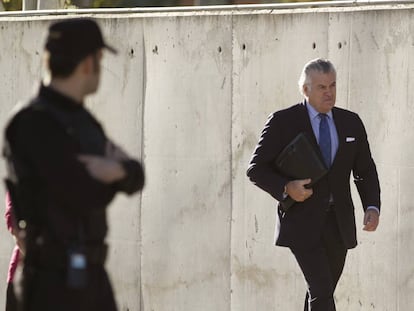Prime Minister Rajoy will have to appear as witness in G¨¹rtel case
Judges rule against solicitor general, who argued existence of slush fund has already been proven

Prime Minister Mariano Rajoy will have to appear as a witness in the ongoing G¨¹rtel case, a massive investigation into a kickbacks-for-contracts scheme that has plagued the Spanish leader¡¯s Popular Party (PP) for years. Magistrates from Spain¡¯s central High Court in charge of the case have voted two to one that Rajoy should be cited to testify, despite opposition to the move from the anti-corruption public prosecutor and the solicitor general¡¯s office.

Under Spanish law, the prime minister is obliged to give a witness statement when called on to do so by judges. The court will now have to decide whether Rajoy must take the stand in person, or whether he is allowed to submit his answers in writing. The latter option is legally possible for members of the royal family and top government officials, but only when the questions deal with facts that witnesses should have knowledge about as a direct result of the position they hold.
Rajoy should have been aware of the illegal activities in which the party treasurer was involved, argue the prosecution
The request for Rajoy to appear as part of the case was filed by the private prosecution in the case, represented by the Association of Democratic Lawyers for Europe (ADADE). In opposition to the request, the Spanish public prosecutor had argued that Rajoy¡¯s testimony would be ¡°redundant,¡± given that the existence of a slush fund within the PP, which was created thanks to kickbacks from the so-called G¨¹rtel network of businesses, has already been established.
According to prosecutor Concepci¨®n Nicol¨¢s, testimony from the prime minister ¡°would not be relevant.¡±
Meanwhile, the solicitor general had expressed similar opposition. ¡°No new elements have come to light during the trial that would point to the need for a statement,¡± said Edmundo Bal.
The basis for the request is the fact that Rajoy was general secretary of the PP while Luis B¨¢rcenas was the treasurer. B¨¢rcenas is the man accused of having overseen the slush fund, and has fallen foul of the law after he was discovered to have squirreled away millions of euros in tax havens. Given his position at the time, the prosecution argues, Rajoy should have been aware of the illegal activities in which B¨¢rcenas was allegedly involved.
ADADE has also argued that the public has the right to ¡°hear the highest-ranking officials¡± involved in the case, and claims that the lawyer that is representing the PP during the trial is trying to divert the responsibility for the use of the funds for illegal spending on election campaigns on the beneficiaries at the time: two mayors of Madrid satellite towns Majadahonda and Pozuelo. The strategy of the lawyer, ADADE argues, is to ¡°save the boss, Rajoy,¡± by trying to assign responsibility on ¡°lower levels.¡±
English version by Simon Hunter.
About the G¨¹rtel case
The sprawling G¨¹rtel case involves a corrupt business network that operated across six Spanish regions between 1999 and 2005. It was allegedly run by Francisco Correa (whose surname loosely translates as belt, or G¨¹rtel in German), a businessman who cultivated relationships with PP officials, offering them gifts in exchange for government contracts in public works and event organization. At the height of his power, Correa went by the nickname of Don Vito, after the character in The Godfather.
With nearly 200 official suspects, it became the largest pre-trial probe in modern Spanish history and was broken up into sections to facilitate the investigation. The main trial began on October 4 at the Audiencia Nacional, Spain's high court, with 37 people on the dock.
In February of this year, Francisco Correa, considered the mastermind behind the bribes-for-contracts network, and his aides Pablo Crespo and ?lvaro P¨¦rez, aka El Bigotes (the Mustache), were found guilty in connection with a section of the G¨¹rtel case known as Fitur, involving embezzlement, influence peddling, bribery of public officials and conspiracy in the Valencia region.
They were sentenced to 13 years in prison each by the Valencia region's High Court.?All three now face further trials in connection with the G¨¹rtel network.
One of the other ramifications of the case involves the possibility of illegal party financing by the PP. Secret accounts kept by former treasurer Luis B¨¢rcenas suggest the existence of a slush fund within the conservative party, something that he himself has admitted to be true.?Over two-thirds of the alleged donations to the PP violated party financing legislation, either because they went over the legal limit or because they were made by individuals or businesses that were barred from being donors.
Tu suscripci¨®n se est¨¢ usando en otro dispositivo
?Quieres a?adir otro usuario a tu suscripci¨®n?
Si contin¨²as leyendo en este dispositivo, no se podr¨¢ leer en el otro.
FlechaTu suscripci¨®n se est¨¢ usando en otro dispositivo y solo puedes acceder a EL PA?S desde un dispositivo a la vez.
Si quieres compartir tu cuenta, cambia tu suscripci¨®n a la modalidad Premium, as¨ª podr¨¢s a?adir otro usuario. Cada uno acceder¨¢ con su propia cuenta de email, lo que os permitir¨¢ personalizar vuestra experiencia en EL PA?S.
?Tienes una suscripci¨®n de empresa? Accede aqu¨ª para contratar m¨¢s cuentas.
En el caso de no saber qui¨¦n est¨¢ usando tu cuenta, te recomendamos cambiar tu contrase?a aqu¨ª.
Si decides continuar compartiendo tu cuenta, este mensaje se mostrar¨¢ en tu dispositivo y en el de la otra persona que est¨¢ usando tu cuenta de forma indefinida, afectando a tu experiencia de lectura. Puedes consultar aqu¨ª los t¨¦rminos y condiciones de la suscripci¨®n digital.










































